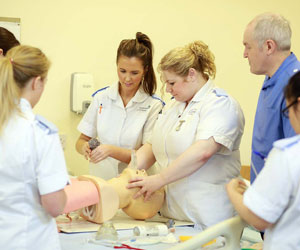Professional Midwifery Advocate is a 12-week course, and consists of 8 days of on-line learning, 2 days independent study and additional hours allocated for clinical restorative supervision sessions in the provider Trusts.
The programme delivery is designed to recognise the existing knowledge and experience of, and work with, the participants and will be one of on-line learning utilising a virtual learning environment.
It is expected that the attendees will be prepared to actively participate in group discussions and take responsibility to ask questions, give feedback and support their colleagues.
Course outline
Course summary
Professional Midwifery Advocate is a 12-week course, and consists of 8 days of taught University contact days, 2 days independent study and additional hours allocated for clinical restorative supervision sessions in the provider Trusts.
The programme delivery is designed to recognise the existing knowledge and experience of, and work with, the participants and will be one of blended learning – an approach which combines and aligns learning undertaken in face to face sessions with online learning opportunities. It is expected that the attendees will be prepared to actively participate in-group discussions and take responsibility to ask questions, give feedback and support their colleagues.
Taught dates
2025
- March
Programme Specification
Assessment, Feedback, and Teaching and Learning methods
Full details are available in the programme specification.
Timetables
The teaching timetable should be available from the end of August. Access to the timetable is through the Student Hub – you will be able to access the Student Hub after you have completed online registration. The teaching day is 9am to 6pm, Monday to Friday; please keep your other commitments open until confirmation of your teaching timetable, and bear in mind that many courses will offer placements or fieldwork which sometimes extends into the evenings and weekends.
Entry requirements
Have a question about our entry requirements?
Entry Requirements
See course specific entry requirements listed below.
Selection Criteria
- Applicants must be able to evidence previous study at level 6 or meet the non standard criteria for admission to Postgraduate study.
- Applicants must be registered with NMC (with live registration status) and must satisfy the employers internal processes for attending a programme of education.
Application information
Making your application
Applications should be made online directly to the university using the apply button above. If you need more details or guidance, please contact enquirycentre@cumbria.ac.uk. There is no official closing date but we would encourage you to apply as early as possible, as many courses are competitive.
What makes a good application?
We consider all aspects of your application, not simply your qualifications and grades. We look at your academic background and performance, relevant experience (particularly for professional courses where some voluntary or paid experience is required) and your reference. Above all, we look for motivation, commitment and potential-evidence that you can benefit from study at higher education level.
Make sure you include:
- Relevant qualifications/evidence of ability: check our website for the specific entry requirements required for each course. Tell us your previous academic results and your projected grades.
- A supportive reference, from an employer or your school or college.
- A good personal statement.
- Explain clearly what attracts you to the course and tell us about your wider interests and experience. If you are applying for a course that incorporates professional training and placements, you should include any relevant experience or visits you have made in the workplace. Highlight your individual strengths and qualities, personal skills, capacity for teamwork, contribution to the community and your enterprise, originality and determination. Select some activities which bring out these qualities.
What next?
When we receive your application, we will send you an acknowledgement and if you are successful at this stage you will get either an offer (with an invitation to visit the campus to which you have applied), or an invitation to interview on a particular date. If we are not able to offer you a place on your chosen course we will usually try to offer you a place on a similar course and will contact you to discuss this. Alternatively, if we think you are suitable, but cannot offer you a place on your preferred campus because of the level of competition, we will offer you a place at another campus if one is available.
And if I accept?
The admissions team will contact you and send further information from February onwards about accommodation, and from May/June onwards about preparing to join the university. If you have any other queries, please telephone the admissions offices for information and advice on 0845 6061144.
Deferred entry
We welcome applications for deferred entry on some courses. If you have specific plans during your year out, indicate these on your personal statement as they may be relevant to your course and could enhance your application.
International students
Please see the international pages of our website for full details of our entry requirements (including English-language skills) as well as contacts for advice and support.
From 2009 the UK Border Agency introduced a Points-Based Immigration System (PBS) for students coming to the UK from outside the European Economic Area (EEA). Students entering higher education will need to obtain a Confirmation of Acceptance (CAS) plus finance confirmation to obtain a Tier 4 student visa. UK education providers are licensed by the UK Border Agency. When students apply for their visa (or entry clearance) they will need a valid Certificate of Acceptance of Studies from the university. Please note that a CAS is not a guarantee that a visa will be issued.
Student finance
We have a wide range of scholarships, bursaries, grants and funds available to support you throughout your studies with us. This includes the Cumbria Bursary - a non-repayable bursary designed to support first year students with a household income of less than £25,000..
Student Finance Tuition Fee Policy





